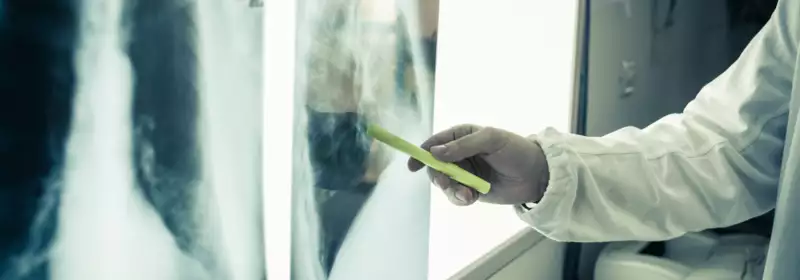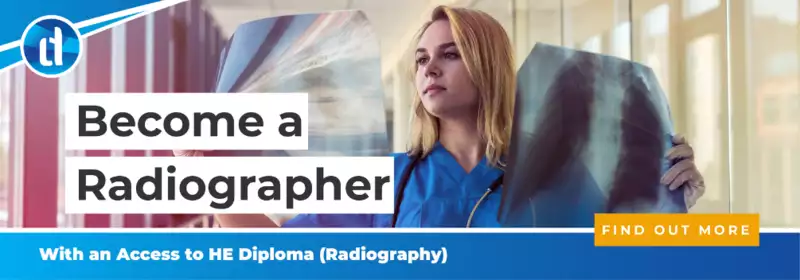To become a radiographer requires degree-level learning. This is because radiographers need to have an in-depth understanding of the equipment they use. Poorly done x-rays or other diagnostic processes could result in misdiagnosis which can be dangerous for a patient.
As a radiographer, you’ll predominantly work with x-rays producing radiographs. However, you’ll also need to know how to use CT scans, ultrasounds, and MRIs. Because of the technical skills radiographers possess, they’re often in demand across the UK.
You have the opportunity to earn up to £50,000 with experience. Not to mention the chance to work alongside other health professionals and potentially save people’s lives.
What’s more, there’s plenty of opportunity for career progression and specialisation. Making it one of the most desirable sectors of health care to work in.
No matter what your previous experience is or what qualifications you have, you can still become a radiographer. Read on to learn how you can take your first steps towards becoming a professional radiographer today.
What Qualifications do you need?

Depending on your level of experience, preference and what’s available to you will determine the best route. Eventually, all routes will lead you to gain a degree-level qualification and becoming fully qualified.
However, they are still different in terms of their layout and one may be better suited to you and your circumstances. For example, if you are more of a hands-on learner than an independent learner.
Progress through Work Experience
You could work towards becoming a radiographer through work experience. Check if your local hospital near you has a space for a radiography assistant.
This could be the first step towards getting fully qualified. Working alongside experienced professionals and gaining knowledge as you learn on the job.
Most employers won’t have any specific requirements for these positions. However, GCSE qualifications or equivalent in subjects such as English, maths and science can help your application stand out. As well as any other healthcare-related qualifications.
Usually, employers are keen to upskill you in these positions so will let you work part-time whilst studying. Alternatively, you could work full-time and complete theory through distance learning in your spare time. This is ideal should you depend on an income.
The only difficulty with this route is finding a vacancy in the first place. Be on the lookout for potential vacancies and have an up to date resume ready. Double-check the job description thoroughly and make sure your CV aligns with what they’re looking for. This will give you the best possible chance of securing the role.
Complete an Apprenticeship
Another hands-on method that’s available is through an apprenticeship. This is employment-based work experience combined with theory-based study. Usually, apprenticeships last around 36 months and require a certain number of hours and an endpoint assessment.
Although, this route requires specific entry requirements, unlike the previously mentioned route. Common entry requirements include:
- 5 GCSEs grade 4/C or above
- 2/3 relevant A Levels or equivalent
Each apprenticeship provider can set their own requirements. So, double-check directly with your desired provider to ensure you meet the entry requirements set. Also, make sure your apprenticeship degree is approved by the HCPC.
Going to University

The final, and most common, route available would be to complete a degree course through university. Full-time study normally takes between 3/4 years depending on the course you enrol on.
Upon completion of your qualification, you’ll then need to register with the Health and Care Professions Council (HCPC). Allowing you to practice lawfully and ethically as a fully qualified radiographer.
Meeting Entry Requirements
Similar to the apprenticeship route, you’ll need to meet entry requirements for university-level study. This consists of a mix of GCSEs and A Levels or equivalent level qualifications.
An alternative option for those who lack traditional qualifications such as A Levels is the Access to HE Diploma. The Access to Higher Education Diploma (Radiography) is designed to provide highly relevant knowledge to prepare you for related degrees.
Through the course, you’ll learn about various aspects of radiography. Including modules on topics such as:
- Cell Biology
- Electromagnetic Spectrum
- Atomic Structure
- The Human Muscular and Skeletal System
- Medical Physics
- The Roles and Responsibilities of Health Care Professionals
- Human Disease and Prevention
- Radioactivity and more
When you have completed your studies you’ll have learnt the core principles of radiography. Giving yourself the best possible start when you begin your radiography degree.
Studying Online
What’s more, you’re able to complete the Access to HE Diploma (Radiography) completely through online study. This allows you to progress with your learning without impacting your other commitments.
Whether you have a full-time job, care duties or any other commitments. You’re able to study at a pace and place that works for you. You can blitz through the course in a matter of months or take up to two years to complete it. It’s completely up to you.
There will be no attending classes and having to rearrange your schedule like you would at a physical college. Instead, you’re able to open your laptop and begin learning whenever you have time.
This allows you to relax and enjoy the experience. Which in turn means you’re more likely to retain the information.
In addition to this, you’ll also have a tutor who will support your learning. They’ll provide constructive feedback and any extra assistance where needed. This ensures you have the necessary assistance to progress with your learning. Without having to commit to physical college classes.
If you’re ready to get back into education learndirect can help you reach your goals of becoming a radiographer.
learndirect is the UK’s leading online learning provider. We have a range of online courses available including the Access to HE Diploma (Radiography).
All our courses have flexible payment options to spread the cost. As well as dedicated and qualified tutors to support you.
To learn more about preparing for your online learning journey read our blog here.
Get in touch with our advisors for more information on the course or browse below.



















